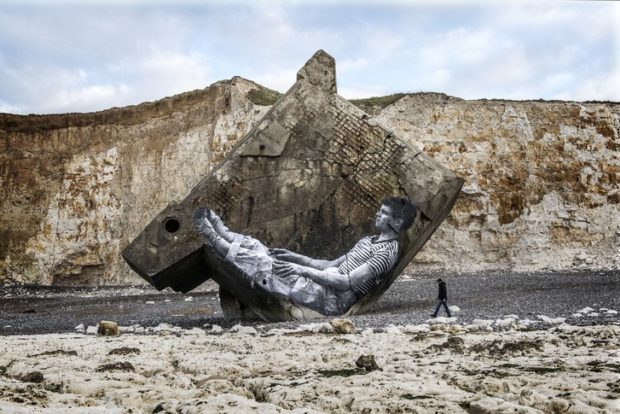 The great Agnes Varda collaborates with photographer JR on a project in which they travel around rural France taking pictures of people, blowing them up to a huge size, and then pasting them up on city walls and other public spaces.
The great Agnes Varda collaborates with photographer JR on a project in which they travel around rural France taking pictures of people, blowing them up to a huge size, and then pasting them up on city walls and other public spaces.
The French director Agnès Varda has been making films for over sixty years, in both fiction and non-fiction form, and she has truly become one of the great figures in world cinema, a genius still going strong at the age of 89. In a world in which the driving concepts of most movies are based on commercial calculations of one kind or another, a Varda film is an expression solely of her artistic inspiration, her essentially humble reverence for the lives of everyday people creating a cinema that seems to flow spontaneously from whatever experiences she chooses to embark upon. This is especially true of her documentaries, the latest of which is a collaboration with a young French photographer and muralist who goes by the initials JR. The film is called Faces Places, a translation of the more poetic original title Visages Villages.
Varda and JR traveled around rural France in a minivan whose passenger side features a big picture of a camera. Open the door on that side and there is a photo booth, like the ones you used to see where you go in with your friends and take silly pictures of yourselves. So they went to different villages and towns and got to know people in those places, took their pictures, and then JR and his crew blew the photos up to a huge size and then carefully pasted them on local landmarks—walls, buildings, in one case the side of a barn, and so forth. First there’s the simple delight of talking to various ordinary small town folks, and then the even greater pleasure of watching them see their own images displayed in such a big and prominent public way. I noticed first of all that even the most unprepossessing face gains a charm and even fascination when blown up to gigantic proportions like this. But the feelings and insights evoked in the film go deeper.
The elderly Varda, very short and round, with her lovely gnome-like smile, forms a marked contrast with the tall, lanky JR. They develop an odd relationship in the picture—he’s constantly teasing her, which is refreshing because he doesn’t come at her with the kind of stiff reverence you might expect, although at times she becomes annoyed with his humorous jabs. She, in her turn, complains about his constant wearing of sunglasses, which she thinks is a strategy for him to avoid being vulnerable.
This quirky, unrehearsed banter is the background to a marvelous succession of episodes in different villages. In the case of an old mining town, for instance, they use an historical photograph of some of the miners, grandfathers of the current residents, and this picture on the side of an apartment building evokes the passing of time and traditions, honoring memory and making it concrete. In a goat farming district, they put up pictures of goats on a wall, giving the daily occupation of the farmers a pictorial counterpart.
But mostly the faces of living people become celebrated or immortalized as it were, reflecting back to those same people their larger humanity. With Varda approaching 90, mortality, of course, is a theme of the film, and the memorial aspect of the project becomes a touching and emotional tribute to her own life.
Faces Places has a strong feeling of community, of generosity, and love for the reality of how people live, and another quality that’s hard to describe—a sort of quiet joy as we witness the gentle unfolding of the film from shot to shot, scene to scene, as an expression of the graceful and natural style of a true artist.

Francis Ford Coppola’s paranoid thriller stars Gene Hackman as an obsessive surveillance expert struggling with his conscience. Since 9/11, the invasion of our privacy...

In his first western, Tom Hanks plays an itinerant news reader from Texas who tries to transport a young girl who was an Indian...

Jim Jarmusch presents three stories about parents and their grown up children. Jim Jarmusch started out as kind of an eccentric indie filmmaker, but...